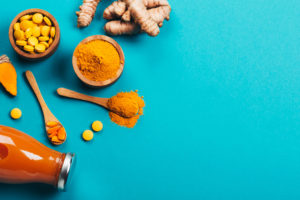 Turmeric gets a lot of praise for its potential health effects. With centuries of use in Ayurvedic medicine and a growing body of scientific research behind it, it really looks like turmeric is a superfood—or should I say super spice.
Turmeric gets a lot of praise for its potential health effects. With centuries of use in Ayurvedic medicine and a growing body of scientific research behind it, it really looks like turmeric is a superfood—or should I say super spice.
Shown to have powerful anti-inflammatory effects, turmeric has the potential to reduce blood pressure and cholesterol, improve insulin sensitivity (improve blood sugar metabolism), repair cells, reduce joint pain, and slow cognitive decline.
Advertisement
Curcumin is noted to be the main source behind these powerful antioxidants and anti-inflammatory effects. It’s highly concentrated in turmeric.
For those unfamiliar with turmeric, it’s a golden colored spice commonly used in Indian and South Asian cooking. If you like curry, you’ve surely eaten turmeric on a number of occasions.
But eating curry, even daily, might not allow you to experience all the potential benefits of this spice. Even heavy seasoning with turmeric or eating a lot of it can leave you well short of therapeutic doses.
The reason is twofold: first is that most curry recipes don’t use as much turmeric as required to get the benefits. And if they do, you’d have to eat servings for four people. The next is that it is not highly bioavailable, meaning it is not well absorbed in the body.
Advertisement
Getting around these drawbacks might seem like a challenge, but it is easier than you might think. You can boost dosage by drinking turmeric in teas, Golden Milk, or other beverages. Increasing bioavailability can be done by taking it with black pepper.
About two teaspoons of turmeric per day, taken with some black pepper, may produce some of its positive health benefits. These benefits can include lower blood sugar, less joint pain, reduced blood pressure, and more. However, it’s much more likely that the effects would be noticed in the 500 mg – 1000 range (1 tsp. of turmeric may have about 200 mg).
Supplementing and getting it naturally, therefore, may be the best. You can include it in your diet by consuming more Golden Milk and eating more curry-based dishes.
